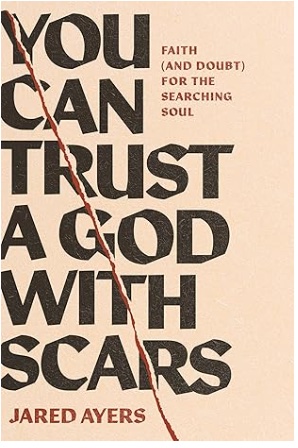
For all the things I’ve written in life, I’ve never written a book. And thus, every time I pick up a book, especially one that promises something as dramatic as this book’s title promises, it always strikes me as a bit of a risk by the author. What if I, the reader, choose a whole different lens by which to read and interpret what he or she or they has written? Can the title still deliver?
It really can, I decided after reading You Can Trust a God with Scars, and in fact, that might have been precisely the hope of Jared Ayers in writing this book. That its readers be not primarily those who could (and would) understand and applaud the theological grounding and perspectives from which it was written, but be people who couldn’t (or wouldn’t). That instead we, all of us, insiders or outsiders, would bring to the book all the very places we are wrestling with life; those places and people and events we haven’t figured out, can’t figure out, if we’re sincere. The places we would actually be willing to wander with Jared, why, and how, and where a God we’ve heard about but perhaps only vaguely know—why or how or where that God, or even if that God, fits into this chaotic world around us.
John Calvin, one of the most prominent voices in the branch of the Christian family tree that Jared and I share, began his signature piece of theology by observing, ‘Nearly all the wisdom we possess, that is to say, true and sound wisdom, consists of two parts: the knowledge of God and of ourselves.’ In other words, if you want to experience a wise, flourishing, fully human life, and if you’re going to understand the holy mystery of your own life fully, you need to come to know God. (Thanks, Jared—I took this paragraph from something else you have written.)
And that’s what Jared does in this book: he introduces us, again or for the first time, to God. If you have read any of what Ayers has written—and if you’re a regular RJ reader, you have—you will be unsurprised to know that, throughout the book, Ayers draws upon a vast knowledge of other great Christian thinkers; on art and music and literature, and what I can only imagine are a voluminous pile of his own scribbled theological reflections.
But just as importantly, there are also conversations he’s had with “friends, neighbors, and congregants as they’ve migrated between faith and doubt”—and, by his own admission, “it also encompasses internal dialogue from my own meandering journey. Honest intellectual inquiry and back-and-forth dialogue with good friends who see the world very differently than I do.”
And so in chapters with enticing titles (Miserable Offenders; God Incarno; or She’s a Harlot, She’s My Mother) and realistic subtitles (The Conditions We’re Swimming In; Why the Cross is Good News; Why Bother with the Church), Ayers gets as real as his title, for people as real as his title: those experiencing “a wandering dissatisfaction; longings and losses, the fickle family of humanity.” And not with the kind of insider cocksureness that believes the church’s argument for God is unassailable simply because it says so out loud, but by honestly probing, with himself, with us, with the people to whom he introduces us, a living God who has not left us alone. A God with Scars.
“I’m often asked by thoughtful friends who are skeptical of Christianity how I could believe in God given the horrors of the world,” Ayers writes in a chapter on Jesus. To which he responds, not in a lecture-y sort of way, but as someone who is seriously wrestling with the Jesus, the Bible, and God outside, he says, the decaying ruins of Christendom: “Only the Christian gospel claims that, to mend the world God made, God enters it and experiences its very worst. Christians, then, don’t claim to know why every terrible thing happens. But we do uniquely believe that the God of the universe has actually experienced the worst of life from the inside.”
I hope, Ayers concludes, that “in some way this book will aid as a conversation partner with you, wherever you are in your own journey, whatever your own process looks like.” The best books—no, better said, the most real books, the most relevant books—are those that do what they set out to do. Jared Ayers has done that, and in a way that invited his readers, including me, more deeply into our own journeys.


2 Responses
Thank you, Jeff. And thank you, Jared. Your two voices I greatly appreciate; I will need to add, “You Can Trust a God with Scars” to my reading list.
With much gratitude, Jeff, and Jared, we are welcomed to journey with you. You have helped us do that.